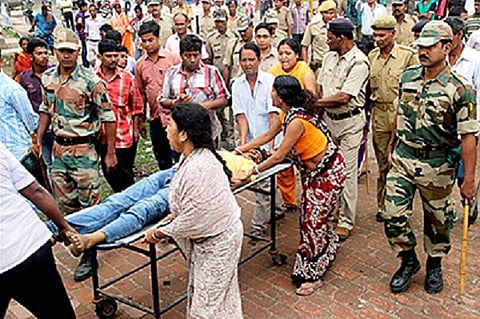

Another election, and another round of stories of booth capturing, clashes and murders.
On Thursday, a 35-year-old man’s body was found lying outside a polling booth in Murshidabad. The man, identified as Tahidur Islam, was killed by bombs hurled outside the polling booth. He was a CPI(M) supporter and the day was the third phase of the assembly elections.
Tahidur Islam’s death is not the first political 'murder' in the state which has a long and infamous history of electoral violence, which some say, dates back to the pre-independence era, and a somewhat romantic culture of belief in the revolutionary spirit.
This long history of violence explains why the Election Commission (EC) decided to conduct elections in West Bengal over six phases, while Tamil Nadu, a much larger state, will go to polls on a single day.
2016
Tahidur’s murder is not the first instance of violence observed during the current assembly polls. On April 11, when polling during the first phase of the elections was taking place, there were instances of polling agents of being assaulted and instances of party cadres carrying firearms in public.
2015
According to official figures, the last elections conducted in the state, the 2015 civic polls, saw four political deaths and 462 other instances of violence.
2014
Similarly, in the run-up to the 2014 Lok Sabha elections, there were 14 instances of political killings and 1,166 incidents of violence.
2013
According to the NCRB, there were 26 political murders in West Bengal in the year, the highest in the country.
Political violence has deep roots in the state, and cuts across party lines
According to an article in the Economic and Political Weekly, titled “Party, Power and Political Violence in West Bengal” by Partha Sarathi Banerjee, controlling territories through violence and suppressing political rivals has always been a primary means of ensuring electoral success in most of Bengal outside its urban centres. That truth has remained constant despite the passage of time and changes of regime. This trend which was started by the Congress was carried over into Left practice and has now been perfected by the ruling TMC.
Of course, in this system, loyalties of local strongmen shift from time to time in keeping with the prevailing winds. Over the years, channels of weapons supply have also grown, thanks to certain suppliers with little or no political affiliation.
In a recent Indian Express story, one such illegal weapons maker is quoted as saying, “Anyone can buy. The CPM, TMC, Congress anyone — and they all do. While the supplier may be a supporter of one party, he will sell to all. At the end of the day, this is his business.”
An analysis by Firstpost traces the roots of this culture of political violence to pre-independence times. It thus points to Bengal’s tryst with violent pre-Independence revolutionaries, its non-conformity with Gandhi’s non-violence, and its support to Subhas Bose’s dream of snatching power from the British via armed struggle.
“Bengalis have a very romantic notion of revolution that they feel is synonymous with bloodshed. Though Bengal was never dismissive of Gandhiji, it held its revolutionaries like Surya Sen, Benoy, Badal and Dinesh and Kshudiram Bose in greater esteem,” Open Magazine quoted Pradip Bhattacharyya, former state Congress chief.
The article opens with the claim that the number of political murders in the last six decades can be estimated at around 8,500.
Some of the blame is also laid on the Left Front, which is said to have institutionalized violent means in the state.
Incidentally, Mamata Banerjee gained power in 2011 calling an end to politics of revenge. Her Badla noy, Bodol chaayi (We want ‘Change’ and not ‘Revenge’) slogan was considered as one of the USP that ensured the landslide victory in her favour.
However, little changed on the ground.
Meanwhile, any attempts by the Election Commission to mitigate violence and conduct free and fair elections, such as by transferring officials where necessary, is always criticised by the ruling party of the day as an attempt to show favouritism to the opposition. This was reportedly the cause of the controversy in June 2013, between the Trinamool government and the state election commission led by Mira Pande.
Mamata Banerjee thundered ‘Poriborton’ into to the mic at election rallies in 2011, promising a change from the CPI(M)’s politics. However, as Sunanda K Datta Ray, a senior journalist says, "The irony is that many of Trinamool's hooligans today were the CPI (M)'s hooligans yesterday!"